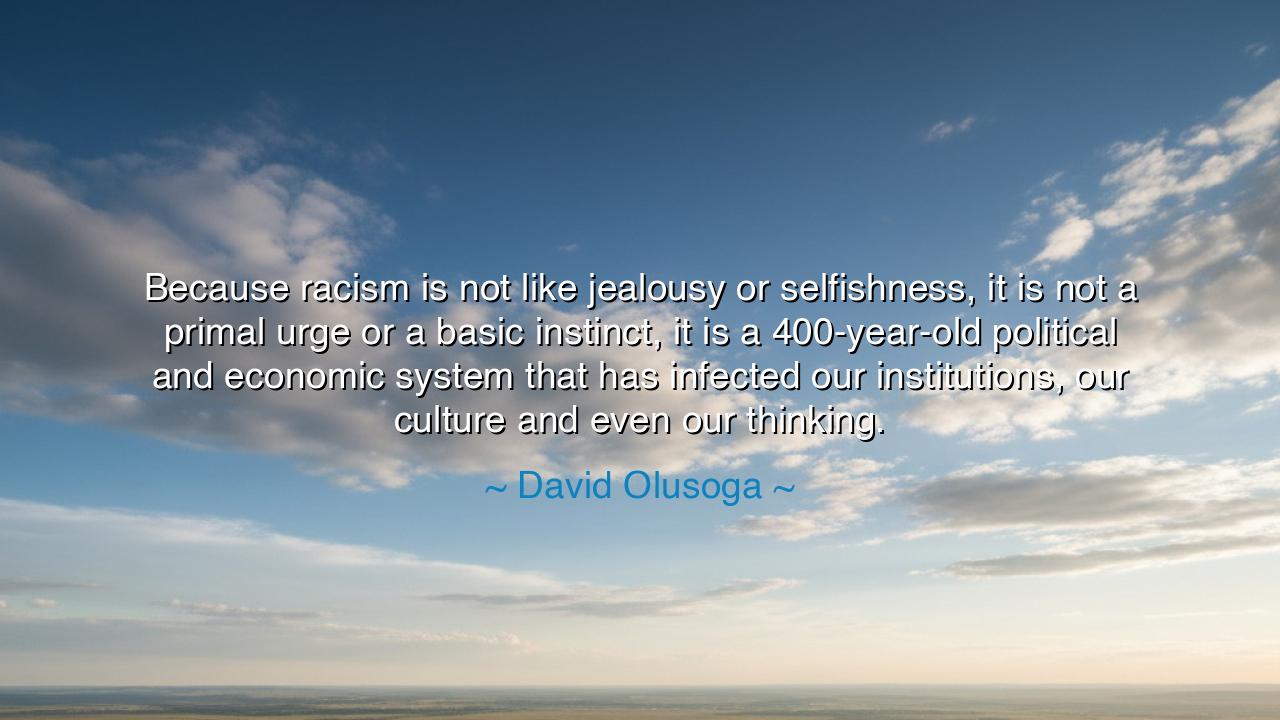
Because racism is not like jealousy or selfishness, it is not a
Because racism is not like jealousy or selfishness, it is not a primal urge or a basic instinct, it is a 400-year-old political and economic system that has infected our institutions, our culture and even our thinking.






There is both fire and sorrow in the words of David Olusoga, when he declared: “Because racism is not like jealousy or selfishness, it is not a primal urge or a basic instinct, it is a 400-year-old political and economic system that has infected our institutions, our culture and even our thinking.” This is not a passing observation — it is an indictment of history and a call to consciousness. Olusoga, a historian who has devoted his life to unveiling the shadows of empire, reminds us that racism is not an individual flaw, but a constructed system, a deliberate invention designed to serve power. It was not born from nature, but from strategy — created to justify conquest, slavery, and exploitation.
In his words, we hear the echo of centuries — the clanking of chains across the Atlantic, the voices of men who preached equality while owning slaves, the laws that divided nations and justified cruelty beneath the mask of reason. Olusoga’s wisdom pierces the comforting myth that racism is simply an emotional failing, a momentary hatred in the heart. No — it is older, deeper, more enduring. It was built into the very structures of civilization, woven into trade, religion, education, and law, until it became invisible even to those who benefited from it. The true horror of racism lies not only in its cruelty, but in its subtlety — that it teaches the oppressor to believe himself righteous and the oppressed to doubt his own worth.
When David Olusoga speaks of a “400-year-old system,” he is pointing to the age of empire — to the seventeenth century, when European nations carved the world for profit. To justify the enslavement of millions, they invented a hierarchy of race, claiming divine sanction for their theft and violence. This myth became the foundation of colonial wealth — from the sugar fields of the Caribbean to the cotton plantations of America, from the ivory of Africa to the opium of Asia. Racism was the tool that turned cruelty into policy, and policy into destiny. It was not instinct — it was invention. And like all inventions, it was passed down, refined, and preserved through generations, until its creators no longer remembered that it had ever been made.
Consider the example of the Transatlantic Slave Trade — an enterprise that stretched over centuries, built upon greed but sustained by ideology. Kings, merchants, and clergy alike partook in it, each cloaking their complicity in moral justification. They called Africans “savages,” not because they believed it at first, but because they needed to. To live with their crimes, they rewrote truth itself. And from this rewriting came the racial hierarchies that still shape the world — in economics, in education, in the imagination of entire nations. Olusoga’s insight exposes this lineage, revealing racism not as a momentary sin, but as a legacy that outlived the empires that birthed it.
The tragedy, he says, is that this system has not only infected our institutions, but also “our culture and even our thinking.” It has shaped how history is told, whose voices are heard, whose beauty is celebrated, whose pain is believed. It lives in the subtle bias of a judge, the prejudice of an employer, the erasure of a schoolbook. It whispers through jokes, expectations, and silences. Like a disease, it mutates — from slavery to segregation, from colonization to discrimination — always seeking new forms of survival. To confront it, therefore, one must not only change laws, but purify the heart and mind, cleansing them of inherited lies.
And yet, there is hope in his words — for what is built by man can be unbuilt. If racism is a system, then it can be dismantled through awareness, education, and courage. The first step, Olusoga teaches, is to stop pretending it is natural. We must name it for what it is: a creation of power, designed to divide. Once we see it clearly, we can refuse its logic, dismantle its scaffolds, and rebuild the world upon truth. History, though stained, is not fate — it is instruction. Those who study it honestly gain the tools to heal.
Let this, then, be the lesson passed to future generations: ignorance sustains injustice, but knowledge is the sword that cuts its chains. Do not treat racism as mere emotion to be managed, but as a structure to be torn down. Read deeply. Question what you have inherited. Speak when silence is comfortable. For though four centuries of deceit cannot be undone in one lifetime, the work must begin in every soul willing to see.
Thus, the teaching of David Olusoga stands as both revelation and challenge. Racism is not born of instinct, but of intention. It was built by minds, and so it must be defeated by minds — minds awakened, courageous, and compassionate. Only when knowledge becomes the weapon of the just will the world finally be fenced against the oldest lie it has ever told: that one human being was ever less than another.






AAdministratorAdministrator
Welcome, honored guests. Please leave a comment, we will respond soon